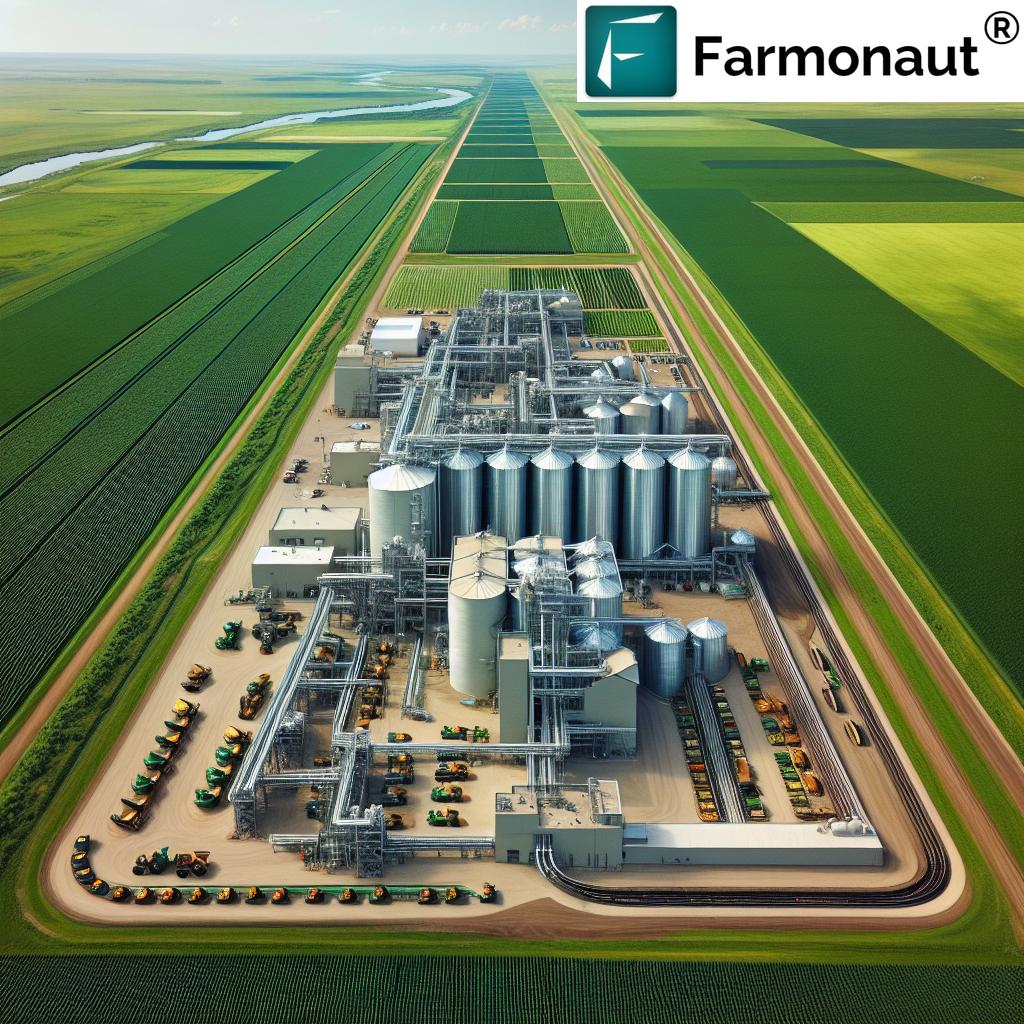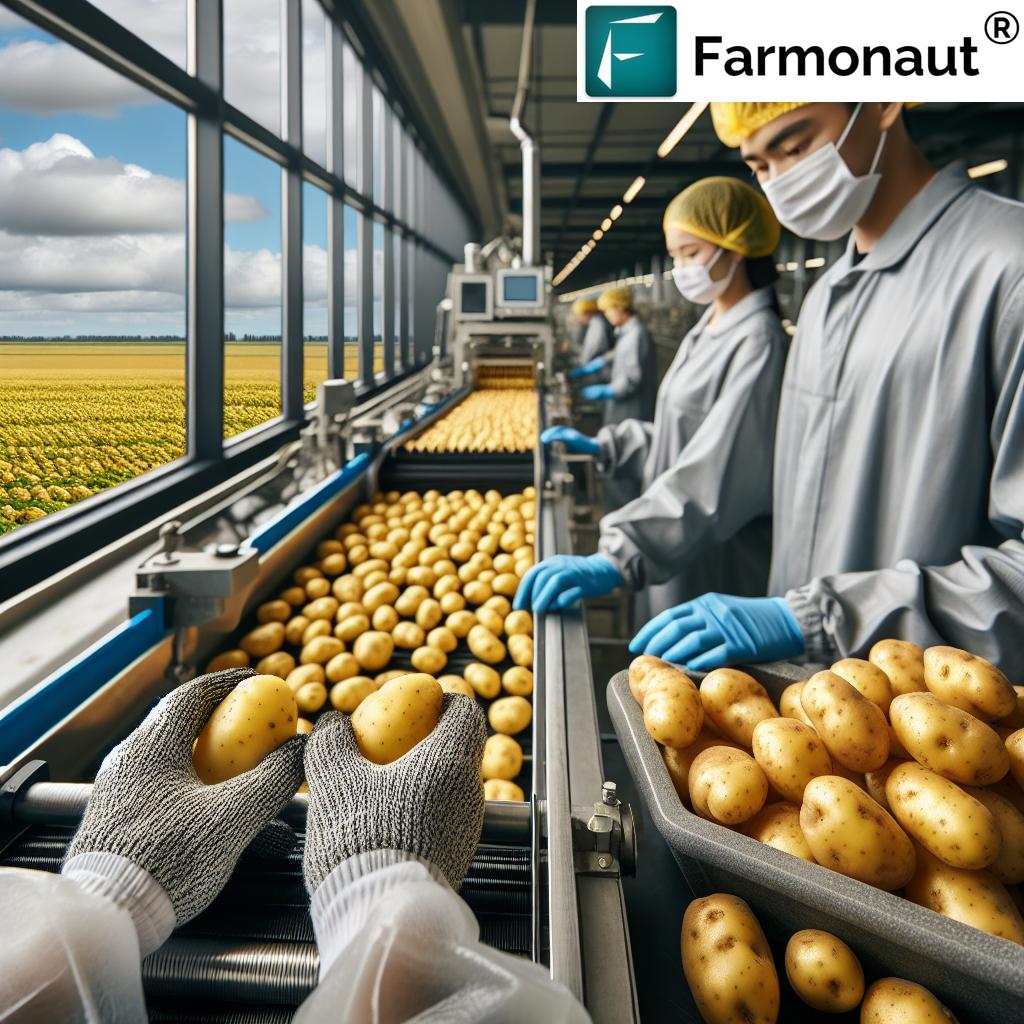Revolutionizing Potato Farming: North Dakota’s $450 Million Investment Boosts Grand Forks Agriculture
“North Dakota’s $450 million potato processing facility aims to revitalize agriculture in the Red River Valley region.”
Welcome to an exciting new chapter in the agricultural landscape of North Dakota! We’re thrilled to share with you the latest developments that are set to transform potato farming in the Grand Forks region. As experts in agricultural technology and satellite-based farm management, we at Farmonaut are closely following this groundbreaking initiative that promises to reshape the future of farming in the Red River Valley.
A Game-Changing Investment in Grand Forks
The recent announcement of a $450 million potato processing facility in Grand Forks, North Dakota, has sent waves of excitement through the agricultural community. This monumental investment is not just a number; it represents a beacon of hope and progress for farmers, the local economy, and the entire potato industry in the region.
Let’s delve into the details of this transformative project and explore how it’s set to revolutionize potato farming in North Dakota.

The Heart of the Red River Valley: A Perfect Location
The choice of Grand Forks as the site for this new facility is no coincidence. Situated in the heart of the Red River Valley, this area is renowned for its fertile soil and ideal growing conditions for potatoes. The region’s rich agricultural heritage, combined with the expertise of North Dakota farmers, makes it the perfect location for such a significant investment.
- Fertile soil conducive to potato growth
- Established agricultural infrastructure
- Experienced and dedicated farming community
- Strategic location for distribution
As we at Farmonaut understand the importance of soil quality and environmental conditions for successful farming, we can’t stress enough how crucial this location choice is for the success of the project.
Agristo: The Driving Force Behind the Investment
The company behind this massive investment is Agristo, a family-owned Belgian enterprise with a rich history in potato processing. Since transitioning from vegetable processing to exclusively potato processing in 1987, Agristo has established itself as a leader in the industry.
With operations already flourishing in the Netherlands, France, and India, Agristo’s decision to set up shop in North Dakota speaks volumes about the potential they see in the region. Their expertise in potato processing, combined with the agricultural prowess of North Dakota, creates a powerful synergy that promises to yield impressive results.
Economic Impact: A Boost for Grand Forks and Beyond
The establishment of this potato processing facility is not just about potatoes; it’s about creating a ripple effect of economic growth throughout the region. Let’s take a closer look at the projected economic impact:
| Impact Category | Estimated Value | Timeframe | Notes |
|---|---|---|---|
| Initial Investment | $450 million | Immediate | Capital injection into the local economy |
| Job Creation | 500+ direct jobs | Within 2 years | Additional indirect jobs expected in related industries |
| Farmland Reclamation | 10,000+ acres | 5-10 years | Bringing previously unused land back into production |
| Annual Potato Production | 200,000+ tons | Annually | Estimated increase in regional potato output |
| Revenue Generation | $100+ million | Annually | Projected facility revenue, not including indirect economic benefits |
| Economic Multiplier Effect | 2.5x investment | Over 10 years | Estimated total economic impact on the local economy |
These projections highlight the transformative potential of this investment for Grand Forks and the surrounding areas. The creation of jobs, reclamation of farmland, and injection of capital into the local economy are set to create a positive cycle of growth and development.
Reclaiming Lost Farmland: A Second Chance for Agriculture
One of the most exciting aspects of this project is the potential to reclaim farmland that has been lost due to drought and changing agricultural practices. Gary Shields, executive director of the Northland Potato Growers Association, expressed optimism about this development, stating that it would lead to the recovery of previously diminished production areas.
This reclamation effort is not just about increasing potato production; it’s about:
- Revitalizing rural communities
- Improving soil health through sustainable farming practices
- Increasing biodiversity in the agricultural landscape
- Enhancing food security in the region
At Farmonaut, we understand the importance of maximizing land use efficiency. Our satellite-based crop monitoring technology can play a crucial role in helping farmers manage these reclaimed lands effectively, ensuring optimal crop health and yield.
Yellow Potatoes: A Strategic Focus
“Grand Forks’ new facility targets major grocery chains, focusing on yellow potato production for retail sales.”
Agristo’s decision to focus on yellow potatoes for retail sales is a strategic move that sets them apart in the market. This choice is driven by several factors:
- Growing consumer preference for yellow potatoes
- Higher nutritional value compared to some other varieties
- Versatility in cooking applications
- Strong demand from major grocery chains
By targeting retail sales through major grocery chains like Walmart and Target, Agristo is positioning itself to capture a significant share of the consumer market. This focus on yellow potatoes also complements existing potato processing operations in the area, creating a diverse and robust potato industry in North Dakota.
The Power of North Dakota’s Soil and Farmers
One of the key factors that attracted Agristo to North Dakota was the quality of the soil and the strong work ethic of the local farmers. Doug Goehring, North Dakota’s agriculture commissioner, emphasized that these elements were crucial in securing Agristo’s commitment to the area.
The unique characteristics of North Dakota’s soil include:
- High organic matter content
- Excellent water retention capabilities
- Rich in essential nutrients for potato growth
- Ideal pH levels for potato cultivation
Combined with the expertise and dedication of North Dakota farmers, these soil conditions create an ideal environment for potato production. At Farmonaut, we recognize the importance of soil health in crop production. Our satellite-based soil moisture monitoring can help farmers make informed decisions about irrigation and resource management, ensuring they make the most of these excellent growing conditions.
Explore Farmonaut’s API for advanced agricultural insights
Infrastructure and Site Selection
As the project moves forward, the focus now shifts to site selection and infrastructure development. Two potential locations have been identified:
- The site of the previously proposed Fufeng corn mill
- An area near the future Epitome Energy soybean crush plant
Mayor Brandon Bochenski of Grand Forks has emphasized that the city is committed to supporting Agristo’s engineering and site selection process. This support includes:
- Assessing infrastructure requirements
- Ensuring necessary utilities are in place
- Collaborating with state officials for incentives
- Facilitating smooth integration with existing agricultural operations
The careful selection of the site and development of supporting infrastructure will be crucial for the long-term success of this project. As experts in agricultural technology, we at Farmonaut understand the importance of proper planning and resource allocation in large-scale agricultural projects.

Complementing Existing Operations
An important aspect of this new development is how it will complement existing potato processing operations in the area. Gary Shields is confident that Agristo will not compete directly with established local players like the J.R. Simplot Company. Instead, the focus on yellow potatoes for retail sales creates a synergy with existing operations that primarily process russet potatoes for quick-serve restaurants.
This complementary approach offers several benefits:
- Diversification of the local potato industry
- Increased market opportunities for farmers
- Enhanced stability in the agricultural sector
- Potential for collaborative research and development
At Farmonaut, we believe in the power of collaboration and diversification in agriculture. Our platform can help both new and existing operations optimize their production through advanced satellite monitoring and AI-driven insights.
Check out our API Developer Docs for integration possibilities
Sustainable Agriculture and Environmental Considerations
As we move forward with this exciting project, it’s crucial to consider the environmental impact and sustainability of potato farming in North Dakota. The reclamation of farmland and increased potato production must be balanced with responsible environmental stewardship.
Key sustainability considerations include:
- Water management and conservation
- Soil health preservation
- Reduction of chemical inputs through precision agriculture
- Energy efficiency in processing operations
Farmonaut’s satellite-based technology can play a significant role in promoting sustainable farming practices. Our crop health monitoring and AI-driven advisory systems help farmers optimize resource use, reducing environmental impact while maximizing yields.
The Role of Technology in Modern Potato Farming
As we embrace this new era of potato farming in North Dakota, it’s essential to highlight the role of technology in modern agriculture. Advanced farming techniques and digital tools are becoming increasingly crucial for success in the competitive agricultural landscape.
Some key technological advancements in potato farming include:
- Precision agriculture using GPS and satellite imagery
- Automated irrigation systems
- Advanced storage and processing technologies
- Data-driven decision-making tools
At Farmonaut, we’re at the forefront of agricultural technology, offering farmers cutting-edge solutions for crop monitoring and management. Our satellite-based platform provides real-time insights into crop health, helping potato farmers make informed decisions throughout the growing season.
Community Impact and Social Responsibility
The establishment of this new potato processing facility is not just about economic growth; it’s also about strengthening the community fabric of Grand Forks and the surrounding areas. This project has the potential to:
- Create new opportunities for young farmers
- Support local education and training programs
- Enhance food security in the region
- Foster a sense of pride and innovation in the agricultural community
As the project develops, it will be important for all stakeholders to work together to ensure that the benefits of this investment are felt throughout the community. At Farmonaut, we believe in the power of technology to not only improve agricultural productivity but also to support sustainable and thriving rural communities.
Looking to the Future: Opportunities and Challenges
As we look ahead to the future of potato farming in North Dakota, we see a landscape filled with both exciting opportunities and potential challenges. The $450 million investment in Grand Forks is just the beginning of what could be a transformative period for agriculture in the Red River Valley.
Potential opportunities include:
- Expansion into new potato varieties and products
- Development of value-added processing techniques
- Increased exports to national and international markets
- Advancements in sustainable farming practices
However, we must also be prepared to address challenges such as:
- Climate change and its impact on potato cultivation
- Market fluctuations and competition
- Balancing growth with environmental stewardship
- Adapting to changing consumer preferences
At Farmonaut, we’re committed to supporting farmers and agricultural businesses as they navigate these opportunities and challenges. Our advanced satellite technology and AI-driven insights can help potato growers in North Dakota stay ahead of the curve and make data-driven decisions for their farms.
Conclusion: A New Chapter in North Dakota Agriculture
The $450 million investment in a new potato processing facility in Grand Forks marks the beginning of an exciting new chapter in North Dakota’s agricultural story. This project not only promises to boost the local economy and create jobs but also has the potential to revitalize farmland and strengthen the potato industry in the Red River Valley.
As we move forward, the collaboration between Agristo, local farmers, government officials, and technology providers like Farmonaut will be crucial in realizing the full potential of this investment. By combining the rich agricultural heritage of North Dakota with cutting-edge farming technologies, we can create a sustainable and prosperous future for potato farming in the region.
We at Farmonaut are excited to be part of this journey, offering our satellite-based crop monitoring and management solutions to support the growth and success of potato farmers in North Dakota. Together, we can revolutionize potato farming and set new standards for agricultural excellence in the heartland of America.
Earn With Farmonaut
Earn 20% recurring commission with Farmonaut’s affiliate program by sharing your promo code and helping farmers save 10%. Onboard 10 Elite farmers monthly to earn a minimum of $148,000 annually—start now and grow your income!
Learn more about our affiliate program
Farmonaut Subscriptions
Frequently Asked Questions
Q: How will the new potato processing facility impact local farmers?
A: The facility is expected to create new opportunities for local farmers by increasing demand for potatoes, particularly yellow varieties. It may also lead to the reclamation of farmland and introduce new farming technologies to the region.
Q: What types of potatoes will be processed at the new facility?
A: The facility will focus primarily on processing yellow potatoes for retail sales, targeting major grocery chains.
Q: How many jobs is the new facility expected to create?
A: While exact numbers have not been disclosed, the project is expected to create hundreds of direct jobs and many more indirect jobs in related industries.
Q: Will the new facility compete with existing potato processors in the area?
A: No, the new facility is expected to complement existing operations by focusing on different potato varieties and market segments.
Q: How can farmers use Farmonaut’s technology to improve potato farming?
A: Farmonaut’s satellite-based technology can help farmers monitor crop health, optimize resource use, and make data-driven decisions to improve yields and reduce environmental impact.
Q: When is the new facility expected to be operational?
A: While exact timelines have not been announced, projects of this scale typically take several years to complete. Updates on the progress will likely be shared as the project develops.
Q: How will this investment affect potato prices for consumers?
A: While it’s difficult to predict exact price impacts, increased production and efficiency could potentially lead to more stable potato prices for consumers in the long term.
Q: What environmental considerations are being taken into account for this project?
A: The project is expected to incorporate sustainable farming practices, water conservation measures, and energy-efficient processing technologies to minimize environmental impact.
Q: How can local businesses and community members get involved in this project?
A: As the project develops, there may be opportunities for local businesses to provide services or supplies. Community members can stay informed through local government and agricultural association updates.
Q: Will the facility process organic potatoes?
A: While specific details about organic processing have not been announced, the facility’s focus on retail markets may include organic options to meet consumer demand.








